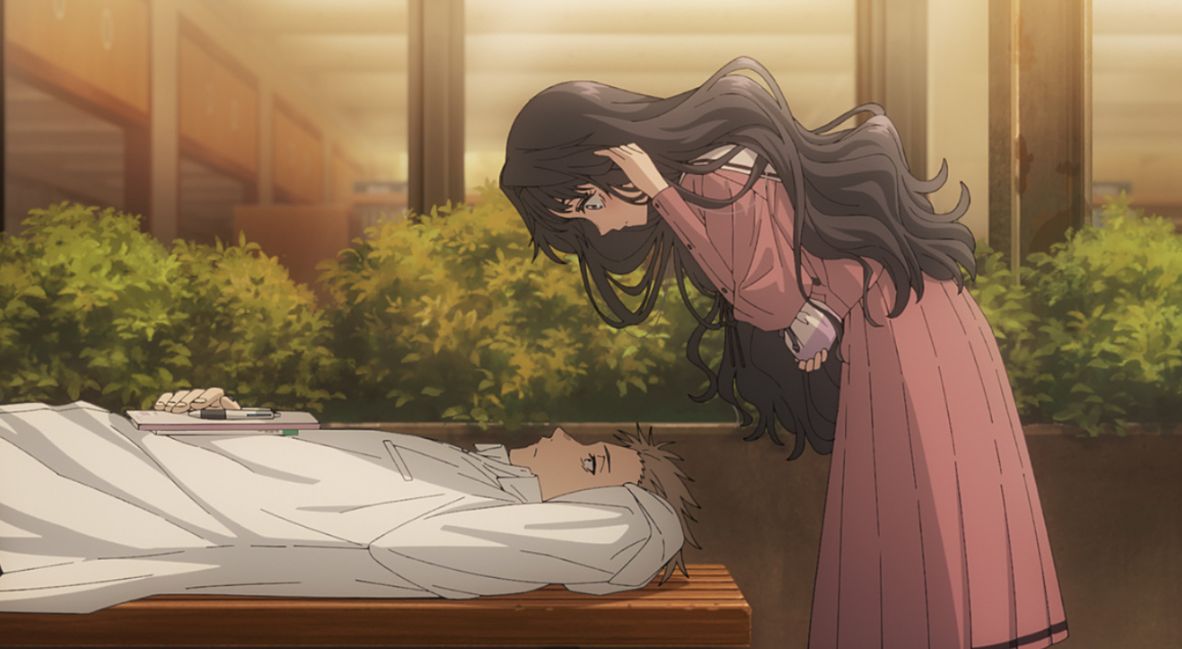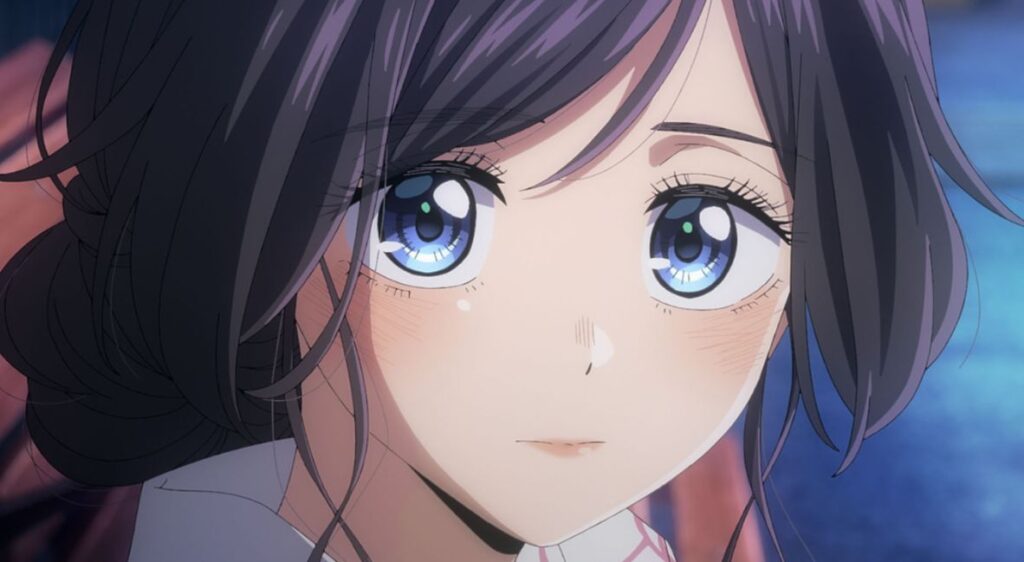In many ways, The Fragrant Flower Blooms With Dignity Season 1 plays like an echo of other series. The opposites-attract romance at the center, the misunderstood characters, the sports festivals, and the group of supportive friends, and days at the beach and summer festivals all recall the best of the slice-of-life genre. Written and illustrated by Saka Mikami, it is sometimes mystifying in just what, in terms of writing, makes the series so good when facing off against others like it that have come before. The answer is confidence, which plays out in this charming Netflix adaptation that grows steadily stronger as the season goes on.
The series follows Rintaro Tsumugi (Yoshinori Nakayama), a student at Chidori Public High School, known for its bad reputation and delinquent student population. While he and his friends don’t fall into that category, the public perception is unyieldingly negative. This is especially true of their neighboring school, Kikyo Private Academy Girl’s High School, where the female population and their teachers and faculty harbor no more than ill will. This rivalry becomes a greater problem, however, when Rintaro meets and befriends one of its students, Kaoruko Waguri (Honoka Inoue).
It’s their relationship and how Kaoruko helps Rintaro grow throughout the first season that are pivotal to the heart of The Fragrant Flower Blooms with Dignity Season 1. But the series refuses to rest simply on this very endearing romance. Instead, the show grows leaps and bounds once the entirety of the main ensemble, including the outgoing Shohei Usami (Kikunosuke Toya), the intelligent Saku Natsusawa (Koki Uchiyama), the optimistic Ayato Yorita (Hiiro Ishibashi), and the introspective Subaru Hoshina (Aya Yamane), are introduced and further fleshed out.
The ensemble lifts The Fragrant Flower Blooms with Dignity Season 1 to its highest potential.

While Rintaro, Kaoruko, and their developing relationship hold the story together, it wouldn’t work quite as well without a sturdy ensemble backing them up. And this is where the series leaves its mark and becomes more than pieces of other stories. One of the greatest assets is both the cast of characters and, more to the point, how, through them, the series remembers a crucial element: they’re teenagers. Meaning, they need guidance and help from time to time, whether from peers, parents, or teachers.
That The Fragrant Flower Blooms With Dignity Season 1 remembers the significance of parental figures in coming-of-age stories shouldn’t be so surprising, but it is. Kyoko Tsumugi (Yoko Hikasa), Rintaro’s mother, is one of the highlights of the series for how she interacts with her son and the lengths she’s gone to to ensure his comfort.
Rintaro begins the story as such an isolated character that it becomes noteworthy to see how others have observed his behavior and, in their own varying levels of empathy, have either offered quite support or reached out to him. Kaoruko helps him see that he’s not ready to stop trying, that he wants to be part of things, and that he doesn’t accept failure. But it’s his friends who’ve sought out and worked for his friendship and his parents who’ve allowed a level of stability to ground him.
Beyond their first meeting, the series really comes together in the back half of Season 1.

These characters are all so lovable that it makes even their most simplistic, adolescent troubles work. The only genuine fault in Season 1 is Subaru’s struggle as she tries to accept Rintaro as part of her friends’ lives. Her trepidation makes sense, but it takes more time than it’s worth to draw out her story, especially when she begins to beat herself up for how she handled it. That, plus a reliance on flashbacks to scenes we just witnessed, hinders some of the earlier episodes that otherwise charm with the will-they/won’t-they romance.
But it all comes together in the back half. First, we learn more about Rintaro and why he was so closed off from his peers due to others’ misconceptions growing up. As all of his friends gather around him and the group first enjoy one another’s company, regardless of school stigma, the series finds its sweet spot. The point where we can watch as these characters foster a place of strength and comfort that allows their friends to flourish and reach beyond whatever previous standards were set for them.
It gets better from there, with Kyoko’s backstory, and then the beach episode where the boys fully welcome Subaru into their unit. But of course, it’s the declaration of love that really cements the series as a must-watch, upending our expectations. There’s no big buildup, no explosive moment. It’s a sweet, tender exchange between two individuals who continue to surprise one another with their mutual care.
Yoshinori Nakayama delivers a fantastic performance as Rintaro.

Rintaro is such a loveable character, and Yoshinori Nakayama delivers such a charismatic performance that it’s easy for Kaoruko to be eclipsed in the central romance. And Nakayama is particularly wonderful in moments of shock, his embarrassment clear in his thunderous “huhs?!” that gives more personality and playfulness to a character who so often defaults to a baritone mumble. But Kaoruko gets her moment in the sun in the finale, which beautifully twists the story, pivoting it into the “she fell first, but he fell harder” trope.
While not all of the animation lives up to the manga, which utilizes a lot of sharp linework to create textured settings from the design of characters’ rooms to the draping of fabrics that emphasize a stylish, youthful energy, it’s reliably strong. It just doesn’t add to the existing artistry that’s on the page. What it excels at is the minute, micro-expressions of a character. From a blush that creeps up a character’s neck and ears to expressions that expose a character’s innermost thoughts, these details and physicality add layers to the characters.
The world is lived in and doesn’t rely on space or implausible vacancy. It might not fill the world to the brim with surprising details like other notable works, but the landscapes and exterior shots are beautiful and add to the overall sense of romance. That, plus a sweet, twinkling score from composer Moeki Harada, creates a sweeping, youthful love story in atmosphere and narrative.
The Fragrant Flower Blooms with Dignity Season 1 will catch you by surprise. While it plays in a familiar sandbox, the way in which the writing highlights small character interactions, the significance of friendships, and the clumsy steps towards first love culminate in an infectious coming-of-age story. Yes, we’ve seen pieces of it before. But when the execution is this precise, this wholesome, and overladen with lovable characters, it hardly matters—familiarity soars when quality is high.
The Fragrant Flower Blooms with Dignity Season 1 is available now on Netflix.
The Fragrant Flower Blooms with Dignity Season 1
-
Rating - 8/108/10
TL;DR
The Fragrant Flower Blooms with Dignity Season 1 will catch you by surprise. While it plays in a familiar sandbox, the way in which the writing highlights small character interactions, the significance of friendships, and the clumsy steps towards first love culminate in an infectious coming-of-age story.







